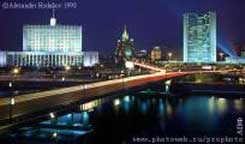Russian government through the eyes of a minister
 New structure of the Russian government from the standpoint of a professional government official
New structure of the Russian government from the standpoint of a professional government official
The way the government functions mainly depends on the country's economy. Obviously, on the one hand, the extent to which the government is influenced by economy depends on the country’s status in connection with the constitution and legislation.
On the other hand however, this extent also depends on the exact goals posed by the government; it depends on its structure and the actual capabilities of its ministers.
Our correspondent discusses this “other side” with Boris Lapshov, one of the ex-high rank officials with a considerable work experience in various ministries and departmental administrations of the Russian Federation.
-How did you react to the president's decision regarding the pre-term dismissal of the government?
-Negatively, from the standpoint of pure business. In case it was a mere PR move, let me tell you, it was a rather unsuccessful one. The president's main argument concerning the government's dismissal appears to be quite weak.
To form a completely new structure of the government and to find ministers to fill in the positions in the course of just several days, without the help of neither the new Prime Minister nor a certain plan of economic and social politics, appears to be strange indeed even for modern-day Russia and is completely atypical for civilized countries. Undoubtedly, we will have to pay for such hurry. it would also be rather naпve to assume that the newly appointed ministers will start by resolving major issues. The first couple of months they will have to form new ministries, develop new strategic plans, define their main functions, deal with new staff members etc.
In addition, the recent dismissal of the Russian government carries other negative aspects as well. At this point, we can only guess how those government officials will treat the new Prime Minister.
-Why do claim that in case this was a mere “PR move” it was an unsuccessful one?
-Perhaps, this would have been a successful PR move, had Putin introduced a familiar and trustworthy individual who knows economics as Prime Minister. In the end, they introduced a person with a modest set of some qualities who had been dealing with trade all his life. This man will have hard time restoring collapsed industries and agriculture, which constitute the basis of any nation.
Prime Minister's message regarding the fact that the government's course will remain unchanged did not appear to be sensational either. A logical question arises: if the government's course will remain unchanged, then why change the government in the first place? Did the former government have a course at all? Did it do anything special to revitalize our agriculture? What would happen, if oil priced resembled those of Soviet times? I do not even want to think about it. How is it possible to adhere to the course to resolve such ambitious task posed by the president and double our GDP in 10 years?
I think that the new government structure, to put it mildly, inspired neither former employees nor those current members of the government, since they realize the price of such PR very well. This however is a separate topic altogether. Overall, the PR campaign connected to the dismissal and the formation of a new government, turned out to be rather upsetting for the president. I am certain, the president lost part the thinking electorate vote after such move.
-Why do you have such negative attitude toward the new government structure? It resembles those used by many European nations.
-First of all, not all European countries have similar scanty minister cabinets. Second of all, unlike European nations, our country is in transitional state of development; we also possess vast territories and bigger population. Thirdly, it is difficult to perceive the main logic behind the fusion of such departments as agriculture and fishing, culture and education, transportation and communication, etc. within one ministry.
Defense agencies, for some strange reasons, are being liquidated after the president announces the need for emergency rearmament of the Russian army. The Ministry of Atomic Power, which is responsible for the most precise and the most dangerous industry, is turned into a mere agency. Such changes take place in times when the rise of domestic industry is considered the most important factor for the nearest decade.
-In your opinion, should the government be reformed in the first place?
-When initiating the reforms, they should not have adhered to the axiom: the less ministries, the better. There has to be an optimal number of them. Such radical structure change based on such strange logic, will eventually lead to a total paralysis of the executive authority.
-What do you think about today's government officials?
-As far as the Prime Minister is concerned, I think I have already presented my point of view. Sadly, not all of today's ministers are professionals. They do have potential however. The fact there is quite a few of Petersburg residents in the government is a bit alarming. The good thing is that St. Petersburg is a big city and presents a wide variety. Another strange factor is that majority of former ministers have been offered to stay in the ministries as deputy ministers. Won't the power remain in their hands anyway?
-There's going to be another government dismissal after the president’s inauguration on May 7th, 2004. That is why it is still not too late to talk about this and hope that the president will introduce proper corrections and substitute some of the ministers.
-Life tends to confirm my thoughts and apprehensions. Despite presidential call to solve major government problems, ministers have to spend their time forming new ministries. Trust me, they will be doing this for a very long time.
The new Prime Minister has already started to surprise us with his decisions. His latest one is especially strange. The prime minister allowed each minister to have only two assistants. Why only two? Will this result in any major changes?
It seems that everything will be fine with corruption on paper as well. It will simply be nonexistent. Where will it come from if those ministers will simply be controlling themselves? Who will openly admit: “yes, I am a thief”? One thing appears calming—such unique government structure cannot live long.
Pyotr Ermilin
Subscribe to Pravda.Ru Telegram channel, Facebook, RSS!





